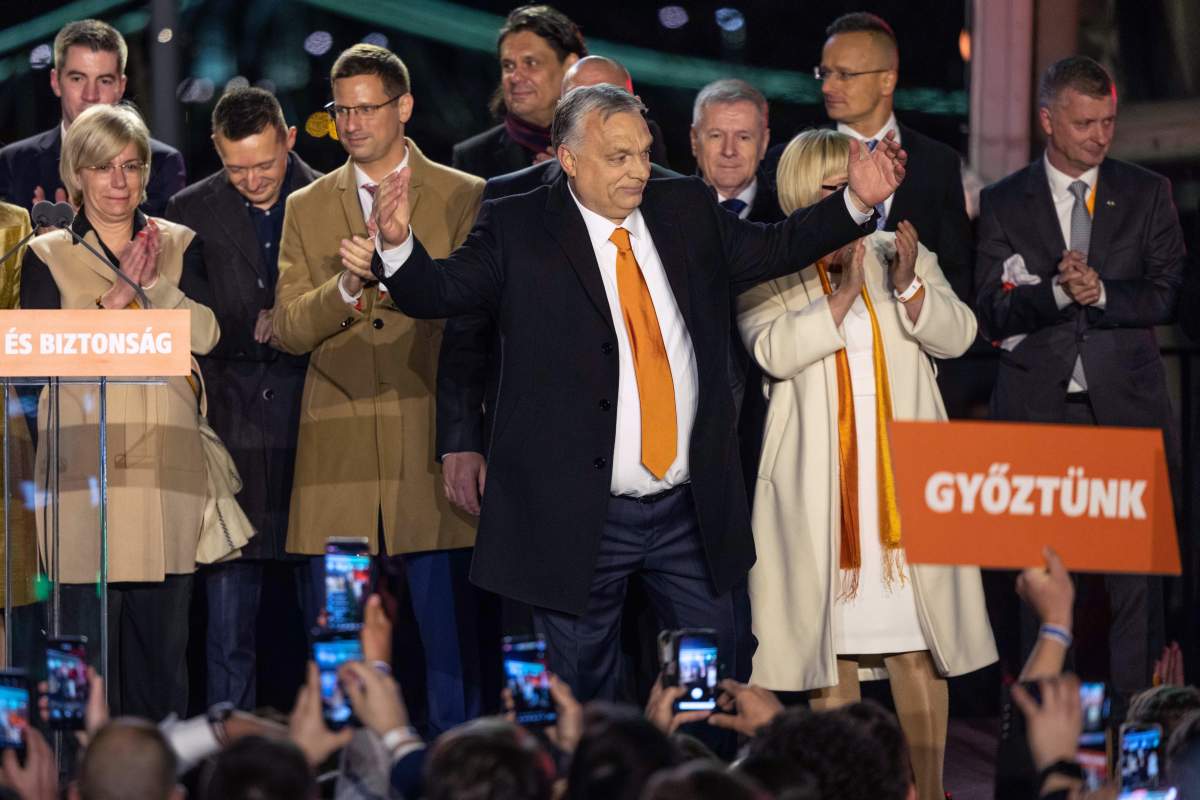Hungary‘s nationalist Prime Minister Viktor Orban scored a fourth consecutive landslide win in Sunday’s election, as voters endorsed his ambition of a conservative, “illiberal” state and shrugged off concerns over Budapest’s close ties with Moscow.

Russia‘s Feb. 24 invasion of Ukraine had appeared to upend Orban’s campaign in recent weeks, forcing him into awkward manouvering to explain decade-old cozy business relations with President Vladimir Putin.

But he mounted a successful campaign to persuade his Fidesz party’s core electorate that the six-party opposition alliance of Peter Marki-Zay promising to mend ties with the European Union could lead the country into war, an accusation the opposition denied.
Surrounded by leading party members, a triumphant Orban, 58, said Sunday’s victory came against all odds.
“We have scored a victory so big, that it can be seen even from the Moon,” he said. “We have defended Hungary’s sovereignty and freedom.”
Preliminary results with about 98% of national party list votes counted showed Orban’s Fidesz party leading with 53.1% of votes versus 35% for Marki-Zay’s opposition alliance. Fidesz was also winning 88 of 106 single-member constituencies.

Get daily National news
Based on preliminary results, the National Election Office said Fidesz would have 135 seats, a two-thirds majority, and the opposition alliance would have 56 seats. A far-right party called Our Homeland would also make it into parliament, winning 7 seats.
His comfortable victory could embolden Orban, 58, in his policy agenda which critics say amounts to a subversion of democratic norms, media freedom and the rights of minorities, particularly gay and lesbian people.
Conceding defeat, Marki-Zay, 49, said Fidesz’s win was due to what he called its vast propaganda machine, including media dominance.
“I don’t want to hide my disappointment, my sadness … We knew this would be an uneven playing field,” he said. “We admit that Fidesz got a huge majority of the votes. But we still dispute whether this election was democratic and free.”
The Organisation for Security and Cooperation in Europe (OSCE) sent a full-scale election monitoring mission for the vote, only the second such effort in an European Union member state.

One-party rule
One of Europe’s longest-serving leaders, Orban has emerged as a vocal supporter of anti-immigration policies and an opponent of tough energy sanctions against Moscow.
Critics say he has sought to cement one-party rule by overhauling the constitution, taking control of a majority of media outlets and rejigging election rules, as well as staffing key government posts with loyalists and rewarding businessmen close to Fidesz with lucrative state contracts.
Still, he wins favor with many older, poorer voters in rural areas who espouse his traditional Christian values and with families who benefit from a host of tax breaks and price caps on fuel and some foodstuffs.
The election comes at a time when global energy woes and steep labor shortages in the region have fueled inflation increases throughout central Europe. Consumer price growth reached an almost 15-year high of 8.3% in February in Hungary.
Critics say the public perception of the war has been influenced by state-controlled media which have amplified Orban’s accusations that an opposition-led government would support sanctions on Russian gas shipments and put Hungary at risk by shipping weapons to Ukraine.
With voting under way throughout Hungary, Ukraine accused Russian forces of carrying out a “massacre” in the town of Bucha, while Western nations reacted to images of dead bodies there with calls for new sanctions against
Orban has condemned the Russian invasion, which the Kremlin describes as a “special military operation” and has not vetoed any European Union sanctions against Moscow even though he said he did not agree with them.
But he has banned any transport of arms to Ukraine via Hungarian territory, facing criticism from his nationalist allies in Poland, and said benefits of close ties with Russia include gas supply security.
His victory, however, is a relief for Warsaw‘s nationalist Law and Justice government which has relied on his backing in Brussels to counter penalties over rule of law breaches.
(Reporting by Krisztina Than; Additional reporting by Anita Komuves and Gergely Szakacs; Writing by Krisztina Than and Justyna Pawlak; Editing by Daniel Wallis and Stephen Coates)








Comments